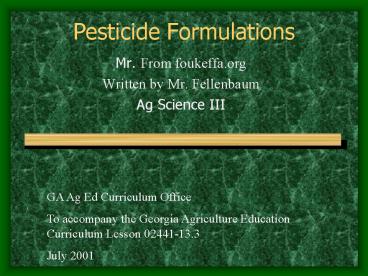Pesticide Formulations - PowerPoint PPT Presentation
1 / 21
Title:
Pesticide Formulations
Description:
Clogs screens and nozzles. Difficult to mix in hard or ... May clog nozzle screens. Agitation required to keep suspended. Dusts (D) 1-10% Active Ingredient ... – PowerPoint PPT presentation
Number of Views:3193
Avg rating:3.0/5.0
Title: Pesticide Formulations
1
Pesticide Formulations
- Mr. From foukeffa.org
- Written by Mr. Fellenbaum
- Ag Science III
GA Ag Ed Curriculum Office To accompany the
Georgia Agriculture Education Curriculum Lesson
02441-13.3 July 2001
2
Objectives
- Define Pesticide Formulation
- Define the different pesticide formulations
- Discuss the pros and cons of each formulation
3
What is a pesticide formulation?
- The composition of the pesticide
- Made up of two things
- a. Active ingredients-what controls the
pest - b. Inert ingredients-filler material to
spread out the active ingredient
4
Emulsifiable Concentrates
- Known as EC
- Liquid formulation
- Active ingredient dissolved in petroleum based
solvent - Emulsifier added so that oil can disperse in
water - White when added to H20
- 2-8 lbs. active ingredient/g
5
Pros
- Easy to handle, transport, and store
- Little agitation
- Can use with a wide range of applicators
- Nonabrasive to equipment
- Does not plug
6
Cons
- Rapidly absorbed through skin
- Risk of phytotoxicity when temps are high
- Can pit or discolor treated surface
- May deteriorate rubber or plastic
- Fire hazard (petroleum)
7
Solutions
- Active ingredient dissolved in liquid solvent
- May need diluted
- Same pros and cons as ECs
- ULV-Ultra Low Volume
- -80-100 Active Ingredient
- -Less frequent refills
8
Soluble Powders
- Dissolves in water to form true solution
- No extra mixing required
- Similar Pros and Cons to WPs, except they are
not abrasive
9
Wettable Powders (WP)
- Finely ground, dry formulation
- 25-80 Active ingredient
- Forms a suspension when mixed with water
- -Suspensiondoes not dissolve, requires
constant agitation
10
Pros
- Easy to store, transport, and handle
- Slow skin absorption
- Low risk of phytotoxicity
- Low cost
11
Cons
- Constant agitation
- Inhalation of dust
- Abrasive
- Clogs screens and nozzles
- Difficult to mix in hard or alkaline water
- Leaves residue
12
Flowables (F)
- Powder in suspension of a liquid carrier
- 4 lbs/gallon of active ingredient
- Same cons as WPs (except dust)
- Must shake containers
- Easy to handle
13
Dry Flowables (DF) Water Dispersable Granules
(WDG)
- Like WPs, except in granular form
- Granules break apart when they hit H20
- Less dust than WPs
- More easily measured and mixed than WPs
14
Microencapsulated
- Active ingredient encased in a capsule
- Mixed in suspension
- Slow release of active ingredient once applied
15
Pros
- Safe and easy to handle
- Capsule prevents dermal absorption by the
applicator
16
Cons
- Bees may carry capsules back to hive in pollen
basket which can destroy the hive - May clog nozzle screens
- Agitation required to keep suspended
17
Dusts (D)
- 1-10 Active Ingredient
- Mixed with finely ground substance
- No mixing, easy application
- Drift is a problem
- Wind and rain remove quickly
- Irritating to user
- Expensive for amount of AI
18
Baits (B)
- AI mixed with edible substance
- No special application eqpmnt.
- May be attractive to non-target pests
- Dead pests may stink
- Cost high if repeated baiting needed
19
Granules (G) Pellets (P)
- 5-20 AI, applied to porous, solid material
- Used to control pests in soil
- AI absorbed by plant roots
- Little dust or drift hazard
- Need incorporation
- May be eaten by non target animals
- May get trapped in some plants
20
Aerosols
- AI in solution in a pressurized container
- Easy to use and store
- High cost
- Inhalation injury possible
- Drift a problem
- Flammable!
21
Fumigants
- Chemicals active as gases
- Used in soil and closed structures
- Kills anything
- Penetrates cracks
- One treatment enough
- Most hazardous
- Must enclose area































